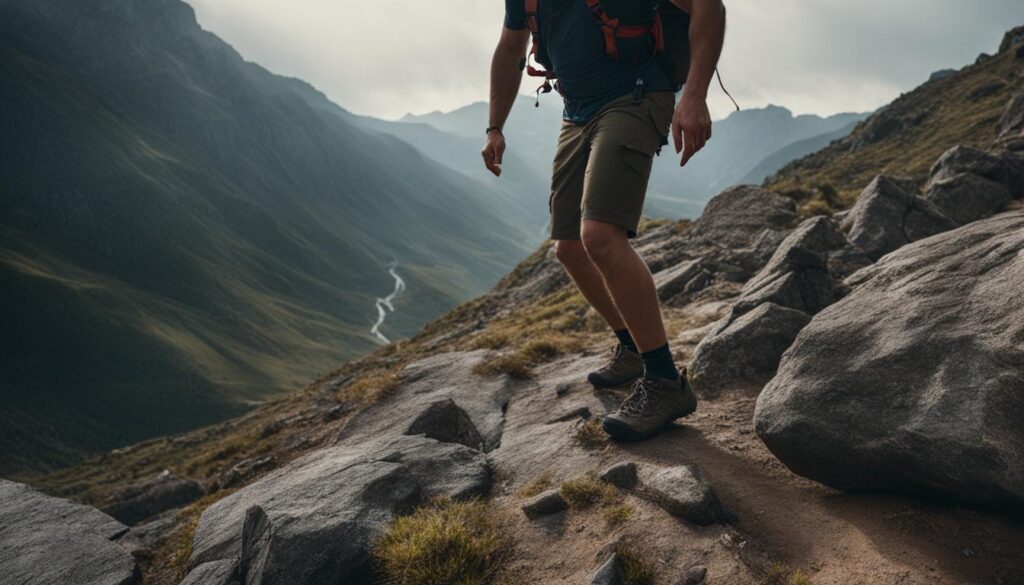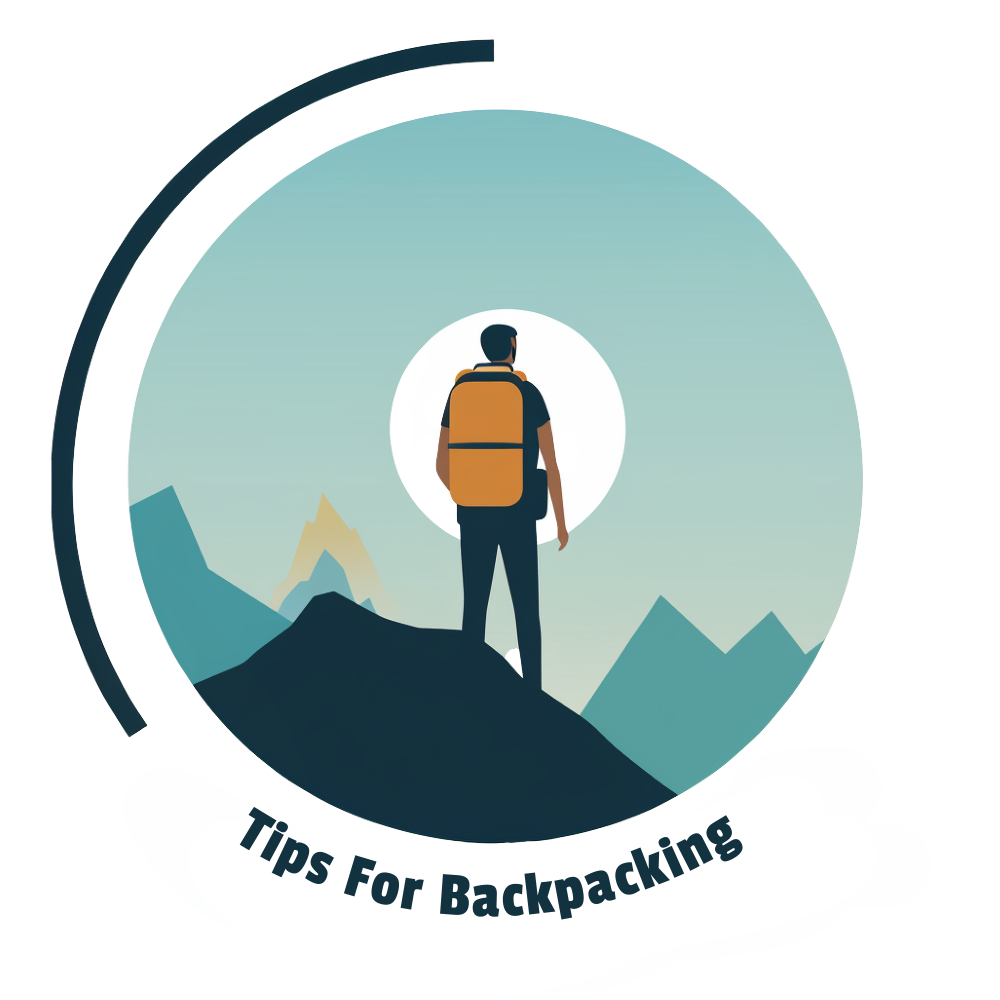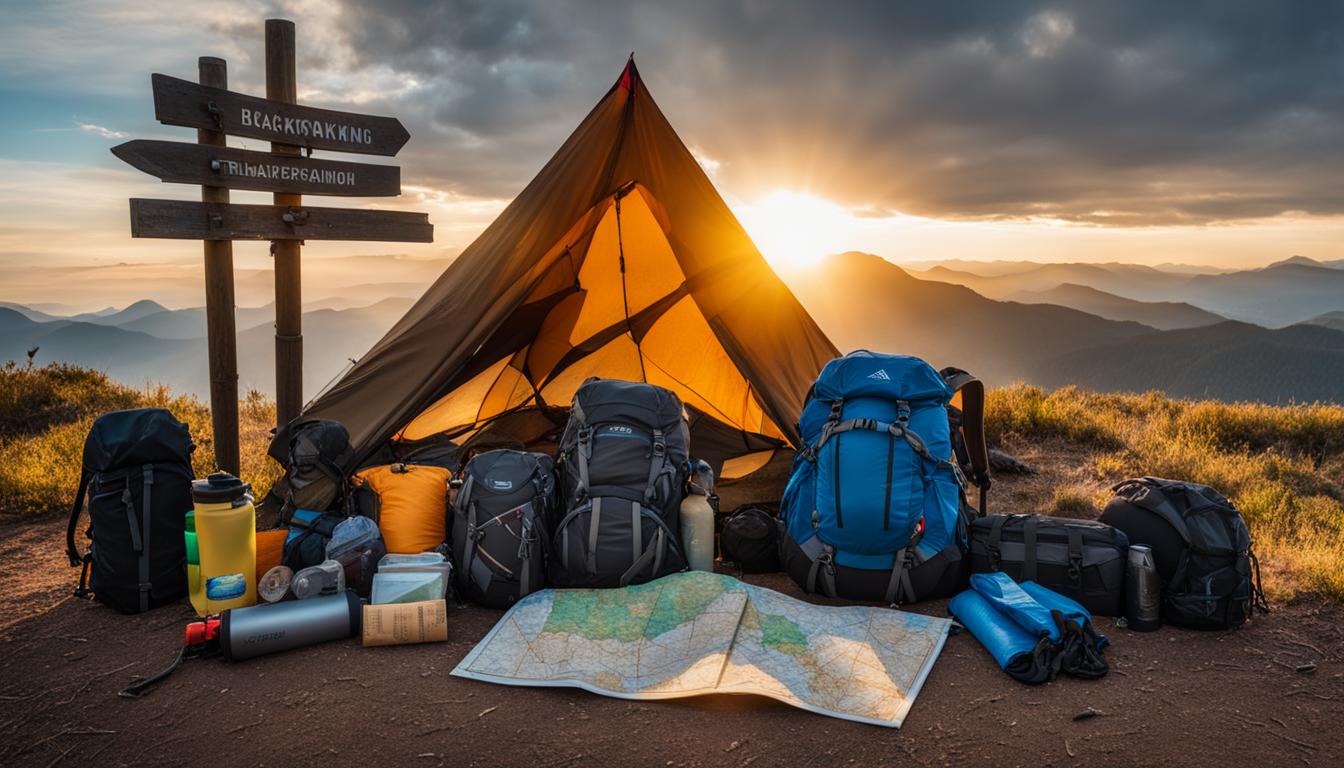Hey there! Are you ready for your first backpacking adventure? As a beginner, it’s important to be well-prepared to ensure a successful and enjoyable trip. In this guide, I will share some valuable tips and essentials for beginner backpackers like you.
Before we dive into the details, let me introduce myself. I’m an experienced backpacker who has had my fair share of rookie mistakes. Through trial and error, I’ve learned the importance of careful planning, packing smart, and acquiring essential skills for a smooth backpacking journey.
Key Takeaways:
- Start with proper planning and avoid common beginner mistakes.
- Pack only the essentials to avoid carrying unnecessary weight.
- Develop basic navigation skills using topographical maps and GPS devices.
- Protect your food stash from animals with odor-proof bags or bear cans.
- Choose lightweight and compact gear for a more comfortable backpacking experience.
Common Mistakes in Backpacking for Beginners

When it comes to backpacking as a beginner, it’s important to be aware of the common mistakes that many rookies make. By avoiding these blunders, you can have a more enjoyable and successful backpacking experience. Let’s take a look at some of the most common mistakes made by beginner backpackers.
Overpacking
One of the biggest mistakes beginners make is overpacking. It’s easy to get carried away and pack too much gear, resulting in a heavy backpack that can be tiring to carry. To avoid this, prioritize essential items and leave behind anything that isn’t necessary. Remember, lighter backpacks make for a more enjoyable hiking experience.
Trying to Cover Too Many Miles
Another common mistake is trying to cover too many miles in a day. It’s important to set realistic goals and pace yourself. Pushing yourself too hard can lead to exhaustion and reduced enjoyment of the journey. Instead, focus on enjoying the scenery and taking breaks when needed.
Lack of Navigation Skills
Many beginners underestimate the importance of navigation skills. Getting lost in the wilderness can be dangerous and stressful. Take the time to learn how to read topographical maps and use GPS devices. These skills will not only help you stay on track but also enhance your overall backpacking experience.
Forgetting to Protect Food from Wildlife
Protecting your food stash from wildlife is essential to avoid losing your food supply. Animals have a keen sense of smell and can be attracted to food even from a distance. Be sure to use odor-proof bags or bear cans to store your food safely and prevent any unwanted encounters with wildlife.
| Mistakes | Consequences |
|---|---|
| Overpacking | A heavy backpack that can lead to fatigue and discomfort during the hike. |
| Trying to cover too many miles | Exhaustion, reduced enjoyment of the journey, and potential injuries. |
| Lack of navigation skills | Getting lost in the wilderness and potential safety risks. |
| Forgetting to protect food from wildlife | Potential loss of food supply and unwanted encounters with animals. |
Backpacking Gear and Preparation Tips for Beginners
As a beginner backpacker, it’s important to have the right gear and be properly prepared for your trip. Packing the right essentials and being equipped with the necessary skills will ensure a safe and enjoyable experience. Here are some tips to help you get started:
Choose Lightweight and Compact Gear
When selecting gear for your backpacking adventure, prioritize lightweight and compact options. This will help reduce the overall weight of your backpack and make it easier to carry on long hikes. Look for backpacks, tents, sleeping bags, and sleeping pads that are specifically designed for backpacking and are made from lightweight materials.
Pack the Essentials
Focus on packing the essential items that you will need during your trip. This includes a reliable backpack, a sturdy tent, a warm sleeping bag, and a comfortable sleeping pad. These items will provide you with shelter, warmth, and a good night’s sleep while out in the wilderness.
Learn Basic Navigation Skills
Having basic navigation skills is crucial for backpacking. Learn how to read topographical maps and use GPS devices to navigate your way through unfamiliar terrain. This will help you stay on the right track and avoid getting lost.
Protect Your Food Stash
When backpacking, it’s important to protect your food stash from wildlife. Use odor-proof bags or bear cans to store your food and keep it safe from animals. This will help prevent any unwanted encounters and ensure you have enough food for the duration of your trip.
| Backpacking Gear Checklist | Quantity |
|---|---|
| Backpack | 1 |
| Tent | 1 |
| Sleeping Bag | 1 |
| Sleeping Pad | 1 |
| Map | 1 |
| Compass | 1 |
| GPS Device | 1 |
| Food Storage Bags/Bear Cans | 1 |
By following these tips and ensuring you have the right gear and preparation, you’ll be well on your way to enjoying a successful backpacking trip as a beginner.
What are the essential tips for beginners to prepare for their first backpacking experience?
When embarking on a first backpacking adventure, it’s crucial to gather the necessary tips for backpacking preparation. Research your destination, pack essential gear like a reliable tent and sleeping bag, plan your meals, and train physically for the trip. Having a solid plan will help ensure a successful and enjoyable experience.
Conclusion
Preparing for a backpacking trip as a beginner requires careful consideration of essential factors. By avoiding common mistakes and following some key tips, you can ensure a successful and enjoyable experience.
First and foremost, it’s important to avoid overpacking. As a beginner, it’s easy to get carried away and pack unnecessary items. Focus on packing only the essentials to keep your backpack weight manageable and prevent unnecessary strain on your body.
Additionally, it’s essential to set realistic goals for daily mileage. Trying to cover too many miles in a day can lead to exhaustion and take away from the overall enjoyment of the journey. Take into account the elevation gain and choose routes that align with your fitness level and experience.
Equipping yourself with basic navigation skills is crucial. Learn how to read topographical maps and use GPS devices to ensure you stay on track during your backpacking adventure. This will help prevent getting lost in the wilderness and ensure a smoother journey.
Lastly, don’t forget about protecting your food stash and ensuring access to safe drinking water. Utilize odor-proof bags or bear cans to keep wildlife away from your food supply. Consider carrying a water filter or purifier to ensure that you have access to clean and safe drinking water throughout your trip.
By following these beginner backpacking tips and considering the essential backpacking gear, you can embark on a successful and memorable adventure. Remember to prioritize preparation, practice navigation skills, and pack wisely. Happy backpacking!

